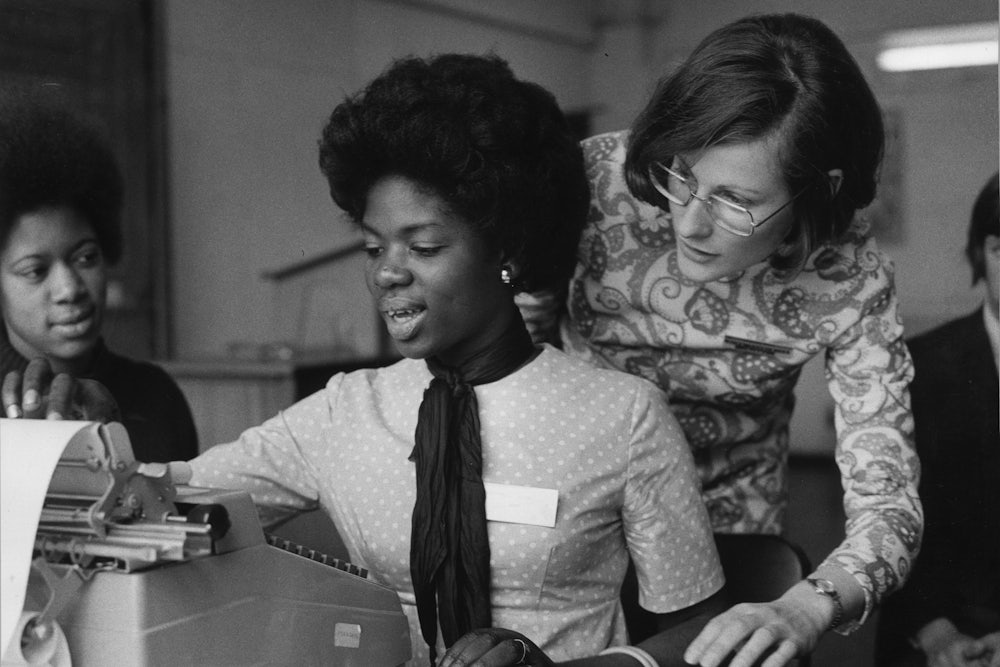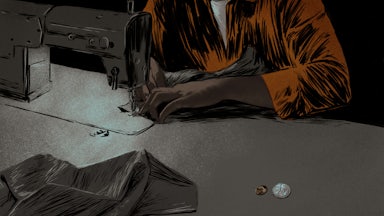“Do you think we’ll ever use unpaid interns?” a friend once asked while we were being used as unpaid interns. It was 2011, in the thick of the long slog of the Great Recession, and we were both working for no pay at different book publishers in one of the most expensive cities in the United States. A few months later, an encampment started in Manhattan’s financial district to protest runaway economic inequality, student debt, and the unfettered greed of Wall Street; sometimes we joined the marches or went to reading groups where we struggled through the first volume of Capital. It was also the year that Ross Perlin’s book Intern Nation was published. “Internships are changing the nature of work and education in America and beyond,” Perlin wrote. “A significant number of these situations are unethical and even illegal under U.S. law—a form of mass exploitation hidden in plain sight.”
The entry-level swamp of New York’s creative and white-collar industries during the Occupy Wall Street era was defined by these questionable internships, often the sole point of entry to careers in media or the arts. (Nepotism works, too.) One person I knew who was hoping to break into the art world worked as an unpaid intern to a Manhattan socialite with gallery and museum connections; she spent her days ferrying the socialite’s dry-cleaning and sorting her emails. Another friend, an aspiring journalist, interned at a weekly magazine fact-checking articles and editing videos for a sub–minimum wage stipend. At the publishing house where I was an intern, I read manuscripts from the slush pile, stuffed books into envelopes, and tried in vain to impress the people on staff into eventually paying me. None of us felt like we had a great many other options for upward mobility, but the longer we worked our internships, the less hope we had of ever transitioning to paid permanent employment. As college graduates from mostly professional-class families, we were simultaneously advantaged and taken advantage of; both displaced employees and our own scabs.
That fall, the collective unease growing within the vast pool of intern labor in creative fields seemed to reach a national boiling point. Two former interns who had worked on the set of the movie Black Swan sued Fox Searchlight Pictures, alleging that the company had violated labor law by not paying them for the work they had completed during the internship, which had included coffee runs, bookkeeping, and taking out the trash. (“The only thing I learned on this internship was to be more picky in choosing employment opportunities,” Alex Footman, one of the plaintiffs, told The New York Times.) In 2013, a judge ruled in their favor, determining that the internship had violated the Fair Labor Standards Act and that the plaintiffs were owed back wages. Over the next few years, that lawsuit precipitated a wave of others by unpaid interns—against Condé Nast, Hearst, NBC, and more—that, for a time, seemed positioned to upend the intern economy. During a small window in the mid-2010s, that is, the intern revolt appeared to be underway. But 10 years later, there are few signs that the entry-level uprising happened at all.
The sprawling practice of white-collar employers using free intern labor, Perlin argued in Intern Nation, not only exploited the interns themselves—predominantly young people, and, according to some surveys, disproportionately women—but also had the effect of shutting out those not in a financial position to work for free from entire industries. Those criticisms animated early efforts to reform and even eliminate internships: Groups like Occupy Wall Street’s Arts and Labor committee in the U.S. and Intern Aware in the U.K. agitated for an end to the practice through a combination of public awareness campaigns and efforts to organize interns themselves. “Interns are often contracted to perform work that is not comparable with educational experience and their labor saves employers an estimated $600 million a year in wages,” the Occupy Arts and Labor group wrote in an open letter calling for the New York Foundation for the Arts to remove unpaid internship positions from its classifieds jobs section. “Moreover, this system benefits people who already possess financial means and can afford to work for free, thus propagating social inequality in the art world.”
As ProPublica has documented, at least three dozen separate lawsuits were filed by former unpaid interns against their employers between the years 2011 and 2014. A handful resulted in the payout of back wages to former interns, and a number of companies that had been named in suits, such as Condé Nast, subsequently shuttered their internship programs or converted them into paid positions. The heightened public attention to the issue and the threat of possible legal action also pressured some employers (particularly those known for espousing progressive politics) to start compensating previously unpaid interns: The Nation magazine, for instance, began paying its interns New York’s minimum wage in 2013, after several wrote an open letter to the editors seeking a raise from their previous stipend of $150 per week. (The New Republic likewise started paying its interns in 2013). Around the same time, the New York state legislature also passed a bill allowing interns to file suits in cases of sexual harassment, a right they had previously been denied on the basis of not qualifying as employees.
But in retrospect, those victories were somewhat more constrained than they had seemed at the time, when the swirl of media attention and ongoing lawsuits felt like the beginning of a small white-collar revolution. A decade after the lawsuit against Fox Searchlight, unpaid internships are nearly as widespread as they were in 2011. One 2018 survey found that 43 percent of internships that year were unpaid, compared to around 50 percent in 2012; another study has estimated that up to 60 percent of internships today are unpaid. Some of the most prestigious internships in the country—such as those as the White House—remain unpaid, and on top of that, because internships aren’t subject to minimum wage laws, many of the internships today that claim to be “paid” offer only meager stipends.
One reason why the number of unpaid or underpaid internships has decreased only slightly since the wave of intern lawsuits has to do, somewhat ironically, with the original lawsuit itself. In 2015, an appeals court challenged the prior ruling on the Fox Searchlight intern lawsuit and established that unpaid internships were legal so long as the employer could claim that the intern was the “primary beneficiary” of the arrangement. By early 2018, the Department of Labor had officially adopted that same open-ended criterion, which afforded employers greater leeway in using unpaid interns. “This standard that the department is setting forth is easier for companies to satisfy in terms of internships qualifying as unpaid,” a labor attorney told Bloomberg that year.
More troubling still, as Perlin has argued, is that the “primary beneficiary” standard established by the courts undermines the ability of interns to take legal action as a class, because each internship arrangement is assessed on an individual basis. “The ‘primary beneficiary’ approach leads to the atomizing result that interns cannot unite to protect themselves,” Perlin wrote after the 2015 ruling. “Thursday’s ruling all but destroys the basis for collective action through class-action lawsuits.” Through one court ruling, in other words, the Fox Searchlight lawsuit that had once seemed so promising had ended up inadvertently further entrenching interns as nonemployees exempt from most labor protections. And though there’s not much data available on intern lawsuits after 2015, they appear to have declined significantly since the ruling, even if a few cases still pop up from time to time.
“The legal challenges were brave and important and raised a lot of awareness,” Perlin told me. “And they did encourage some compliance on the part of employers. But I think the legal strategy also kind of had a limit.”
The prior decade’s internship boom took shape during a supposedly once-in-a-generation job market collapse. With fewer paid positions available, those trying to enter the workforce during the height of the recession were told that internships were a worthwhile way to gain experience while waiting for a real job to come along. “A few years ago you hardly heard about college graduates taking unpaid internships,” the Economic Policy Institute’s Ross Eisenbrey told The New York Times in 2012, a statement that now feels bleakly quaint. “But now I’ve even heard of people taking unpaid internships after graduating from Ivy League schools.”
Today, with the economy in tatters again, white-collar employers will once more have their pick of fresh college graduates hungry for job experience, even when it doesn’t come with a paycheck. And if the last recession was any indication, the abundance of qualified applicants also means that unpaid internships will become more competitive and could even come to replace yet more entry-level jobs across a number of occupations. Worse still is that, as a result of the pandemic lockdowns that started in the spring, a number of employers have already started rescinding internship offers or have temporarily suspended their internship programs. These conditions all but ensure that the positions that remain will become even more desirable.
Carrie Shandra, a sociologist at SUNY Stony Brook who studied changes in internship hiring practices throughout the Great Recession, found that employers began increasing the number of qualifications they sought from prospective interns as the labor market contracted during the downturn. “Even though employers understood that internships were entry-level positions, on the whole, they also started requiring interns to have greater levels of education and more technology skills and basic business skills in the period during and after the recession,” Shandra told me. Her study further found that even as the labor market began to recover, employers by and large didn’t scale back those increased internship requirements. “If you follow a traditional economic model of changes in hiring over the business cycle, then you expect that when unemployment goes down, employers won’t be able to be as picky about hiring as they were before,” Shandra explained. “But that’s not what we observed when we looked at internship hiring. Instead, we saw a sustained increase in skill requirements over that postrecessionary time period, which suggests that this was a structural change, not simply a cyclical one.”
That structural change suggests that employers will always be able to stay one step ahead of interns’ demands without serious legislative intervention. Still, since the wave of lawsuits over the last decade, interns have won some piecemeal wins: Last year, for instance, the advocacy group Pay Our Interns successfully petitioned Congress to start earmarking funds to compensate its interns, arguing that doing so would promote greater racial diversity on Capitol Hill. But as long as internships, even those that are paid, remain a legal gray area that largely exists outside of the reach of most labor laws, they will continue to exploit young people, exacerbate inequality, and perpetuate a credentials arms race among college grads. When I asked Perlin what could be done to fix these problems today, he pointed out that most of the recommendations from his 2011 book were still unfortunately relevant. But, he added, other possibilities for ending the practice of internships once and for all could include larger-scale initiatives like a youth employment program at the federal level. “With all the stimulus packages and bailouts for different industries right now, maybe it’s time for something like a ‘youth bailout,’ or a serious kind of jobs program for young people,” he said. The British government, as it happens, launched one such program in the U.K. last fall to combat youth unemployment during the pandemic.
Internships are a chance, the argument has always gone, for young people to get a foot in the door of a given industry. More internships, then, mean more opportunities for more people to break into their chosen fields, and ending the practice of internships outright would by definition limit valuable entry-level opportunities. But the truth is that a system of employment that tolerates internships in lieu of actual entry-level positions will always have the effect of lowering the floor for all workers. (One anecdotal example: When I tried to negotiate a higher starting salary at one early job I was offered, the manager curtly brushed off the attempt, saying, “You’ve had mostly volunteer positions and internships.”)
When I think about the friends with whom I grumbled about unpaid internships during the Great Recession, it’s clear that we were, in many ways, worse off for having worked for free in our twenties. Yet it’s also true that we’re now mostly gainfully employed in white-collar fields, if not necessarily in the dream jobs we once hoped we’d land. The internship system is deeply exploitative and deeply unfair, and the most insidious thing about it is, perhaps, that it works just well enough for just enough people that the momentum to end it is always fragile.








